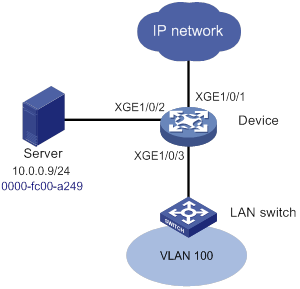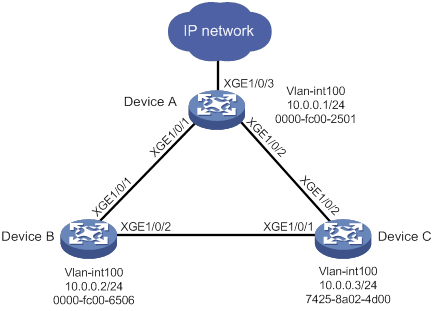- Table of Contents
-
- H3C S6800 & S6860 & S6861 Switches Configuration Examples-Release 27xx-6W100
- 01-Login Management Configuration Examples
- 02-RBAC Configuration Examples
- 03-Software Upgrade Examples
- 04-ISSU Configuration Examples
- 05-Software Patching Examples
- 06-Ethernet Link Aggregation Configuration Examples
- 07-Port Isolation Configuration Examples
- 08-Spanning Tree Configuration Examples
- 09-VLAN Configuration Examples
- 10-VLAN Tagging Configuration Examples
- 11-PBB Configuration Examples
- 12-DHCP Snooping Configuration Examples
- 13-Cross-Subnet Dynamic IP Address Allocation Configuration Examples
- 14-IPv6 over IPv4 Manual Tunneling with OSPFv3 Configuration Examples
- 15-ISATAP Tunnel and 6to4 Tunnel Configuration Examples
- 16-IPv6 over IPv4 GRE Tunnel Configuration Examples
- 17-GRE with OSPF Configuration Examples
- 18-OSPF Configuration Examples
- 19-IS-IS Configuration Examples
- 20-BGP Configuration Examples
- 21-Policy-Based Routing Configuration Examples
- 22-OSPFv3 Configuration Examples
- 23-IPv6 IS-IS Configuration Examples
- 24-Routing Policy Configuration Examples
- 25-IGMP Snooping Configuration Examples
- 26-IGMP Configuration Examples
- 27-BIDIR-PIM Configuration Examples
- 28-Multicast VPN Configuration Examples
- 29-MLD Snooping Configuration Examples
- 30-IPv6 Multicast VLAN Configuration Examples
- 31-Basic MPLS Configuration Examples
- 32-MPLS L3VPN Configuration Examples
- 33-ACL Configuration Examples
- 34-Control Plane-Based QoS Policy Configuration Examples
- 35-Traffic Policing Configuration Examples
- 36-GTS and Rate Limiting Configuration Examples
- 37-Priority Mapping and Queue Scheduling Configuration Examples
- 38-Traffic Filtering Configuration Examples
- 39-AAA Configuration Examples
- 40-Port Security Configuration Examples
- 41-Portal Configuration Examples
- 42-SSH Configuration Examples
- 43-IP Source Guard Configuration Examples
- 44-Ethernet OAM Configuration Examples
- 45-CFD Configuration Examples
- 46-DLDP Configuration Examples
- 47-VRRP Configuration Examples
- 48-BFD Configuration Examples
- 49-NTP Configuration Examples
- 50-SNMP Configuration Examples
- 51-NQA Configuration Examples
- 52-Mirroring Configuration Examples
- 53-sFlow Configuration Examples
- 54-FCoE Configuration Examples
- 55-SPBM Configuration Examples
- 56-OpenFlow Configuration Examples
- 57-MAC Address Table Configuration Examples
- 58-Static Multicast MAC Address Entry Configuration Examples
- 59-IP Unnumbered Configuration Examples
- 60-MVRP Configuration Examples
- 61-MCE Configuration Examples
- 62-Congestion Avoidance and Queue Scheduling Configuration Examples
- 63-Attack Protection Configuration Examples
- 64-Smart Link Configuration Examples
- 65-RRPP Configuration Examples
- 66-BGP Route Selection Configuration Examples
- 67-IS-IS Route Summarization Configuration Examples
- 68-IRF Configuration Examples
- 69-MPLS OAM Configuration Examples
- 70-MPLS TE Configuration Examples
- 71-GRE with VPN Configuration Examples
- 72-VXLAN Configuration Examples
- 73-DRNI Configuration Examples
- 74-IRF 3.1 Configuration Examples
- 75-DRNI and EVPN Configuration Examples
- 76-EVPN-DCI over an MPLS L3VPN Network Configuration Examples
- 77-VCF Fabric Configuration Examples
- 78-PTP Configuration Examples
- 79-S-MLAG Configuration Examples
- 80-MPLS SR Configuration Examples
- 81-Puppet Configuration Examples
- Related Documents
-
| Title | Size | Download |
|---|---|---|
| 57-MAC Address Table Configuration Examples | 85.08 KB |
|
|
|
H3C S6800 & S6860 & S6861 Switches |
|
MAC Address Table Configuration Examples |
|
|
Copyright © 2019 New H3C Technologies Co., Ltd. All rights reserved.
No part of this manual may be reproduced or transmitted in any form or by any means without prior written consent of New H3C Technologies Co., Ltd.
Except for the trademarks of New H3C Technologies Co., Ltd., any trademarks that may be mentioned in this document are the property of their respective owners.
The information in this document is subject to change without notice.
Contents
Example: Configuring static MAC address entries
Applicable hardware and software versions
Example: Configuring MAC address move suppression
Applicable hardware and software versions
Configuring Device B and Device C
Introduction
This document provides MAC address table configuration examples.
Prerequisites
The configuration examples in this document were created and verified in a lab environment, and all the devices were started with the factory default configuration. When you are working on a live network, make sure you understand the potential impact of every command on your network.
This document assumes that you have basic knowledge of the MAC address table.
Example: Configuring static MAC address entries
Network configuration
As shown in Figure 1, for secure communication between users in VLAN 100 and the server, perform the following tasks:
· Assign Ten-GigabitEthernet 1/0/2 and Ten-GigabitEthernet 1/0/3 to VLAN 100.
· Add a static MAC address entry on Device to bind the server MAC address to Ten-GigabitEthernet 1/0/2.

Applicable hardware and software versions
The following matrix shows the hardware and software versions to which this configuration example is applicable:
|
Hardware |
Software version |
|
S6800 switch series S6860 switch series S6861 switch series |
Release 2702 |
Procedures
# Create VLAN 100, and assign Ten-GigabitEthernet 1/0/2 to VLAN 100.
<Device> system-view
[Device] vlan 100
[Device-vlan100] quit
[Device] interface ten-gigabitethernet 1/0/2
[Device-Ten-GigabitEthernet1/0/2] port link-mode bridge
[Device-Ten-GigabitEthernet1/0/2] port access vlan 100
[Device-Ten-GigabitEthernet1/0/2] undo shutdown
[Device-Ten-GigabitEthernet1/0/2] quit
# Configure Ten-GigabitEthernet 1/0/3 (port connected to the LAN switch) as a trunk port, and assign the port to VLAN 100.
[Device] interface ten-gigabitethernet 1/0/3
[Device-Ten-GigabitEthernet1/0/3] port link-mode bridge
[Device-Ten-GigabitEthernet1/0/3] port link-type trunk
[Device-Ten-GigabitEthernet1/0/3] port trunk permit vlan 100
[Device-Ten-GigabitEthernet1/0/3] undo shutdown
[Device-Ten-GigabitEthernet1/0/3] quit
# Add a static entry for MAC address 0000-fc00-a249 on Ten-GigabitEthernet 1/0/2 that belongs to VLAN 100.
[Device] mac-address static 0000-fc00-a249 interface ten-gigabitethernet 1/0/2 vlan 100
Verifying the configuration
# Verify that any 10.0.0.0/24 host in VLAN 100 can communicate with the server. (Details not shown.)
# Verify that the static MAC address entry has been added.
[Device] display mac-address
MAC Address VLAN ID State Port/NickName Aging
0000-fc00-a249 100 Static XGE1/0/2 N
7425-8a02-4d00 100 Learned XGE1/0/3 Y
…
Configuration files
#
sysname Device
#
vlan 1
#
vlan 100
#
interface Ten-GigabitEthernet1/0/2
port link-mode bridge
port access vlan 100
mac-address static 0000-fc00-a249 vlan 100
#
interface Ten-GigabitEthernet1/0/3
port link-mode bridge
port link-type trunk
port trunk permit vlan 1 100
#
Example: Configuring MAC address move suppression
Network configuration
As shown in Figure 2, Devices A, B, and C form a loop because of cable misconnection, and spanning tree protocols are not enabled on the devices. As a result, MAC addresses are frequently moves among Devices A, B, and C. To deal with loop-triggered MAC flapping, perform the following tasks:
· Display MAC address move records to locate the Layer 2 loop.
· Configure MAC address move suppression on Device A to eliminate the Layer 2 loop.

Analysis
To meet the network requirements, you must perform the following tasks:
· For Devices A, B, and C to communicate with each other, assign all inter-connected ports to VLAN 100.
· Configure MAC address move suppression on one or more ports of Device A.
· To monitor the port status change of Device A, enable the log monitoring of the current terminal feature.
· For loop detection, create VLAN-interface 100 and assign an IP address to the interface on each device.
· To display MAC address move records, ping Device B from Device A.
Applicable hardware and software versions
The following matrix shows the hardware and software versions to which this configuration example is applicable:
|
Hardware |
Software version |
|
S6800 switch series S6860 switch series S6861 switch series |
Release 2702 |
Procedures
Configuring Device A
# Enable the monitoring of logs on the current terminal.
<DeviceA> terminal monitor
<DeviceA> terminal debugging
# Create VLAN 100.
<DeviceA> system-view
[DeviceA] vlan 100
[DeviceA-vlan100] quit
# Configure Ten-GigabitEthernet 1/0/1 and Ten-GigabitEthernet 1/0/2 as trunk ports, and assign the ports to VLAN 100.
[DeviceA] interface range ten-gigabitethernet 1/0/1 ten-gigabitethernet 1/0/2
[DeviceA-if-range] port link-mode bridge
[DeviceA-if-range] port link-type trunk
[DeviceA-if-range] port trunk permit vlan 100
[DeviceA-if-range] undo shutdown
[DeviceA-if-range] quit
# Set the suppression interval to 300 seconds. A suppressed port will automatically come up after 300 seconds.
[DeviceA] mac-address notification mac-move suppression interval 300
# Set the suppression threshold to 0. A port will be shut down when the system detects a MAC address move on the port within a MAC move detection interval (1 minute by default).
[DeviceA] mac-address notification mac-move suppression threshold 0
# Enable MAC address move suppression on Ten-GigabitEthernet 1/0/1.
[DeviceA] interface ten-gigabitethernet 1/0/1
[DeviceA-Ten-GigabitEthernet1/0/1] mac-address notification mac-move suppression
[DeviceA-Ten-GigabitEthernet1/0/1] quit
# Create VLAN-interface 100, and assign an IP address to the interface.
[DeviceA] interface vlan-interface 100
[DeviceA-Vlan-interface100] ip address 10.0.0.1 24
[DeviceA-Vlan-interface100] quit
Configuring Device B and Device C
1. Configure Device B:
# Create VLAN 100.
<DeviceB> system-view
[DeviceB] vlan 100
[DeviceB-vlan100] quit
# Configure Ten-GigabitEthernet 1/0/1 and Ten-GigabitEthernet 1/0/2 as trunk ports, and assign the ports to VLAN 100.
[DeviceB] interface range ten-gigabitethernet 1/0/1 ten-gigabitethernet 1/0/2
[DeviceB-if-range] port link-mode bridge
[DeviceB-if-range] port link-type trunk
[DeviceB-if-range] port trunk permit vlan 100
[DeviceB-if-range] undo shutdown
[DeviceB-if-range] quit
# Create VLAN-interface 100, and assign an IP address to the interface.
[DeviceB] interface vlan-interface 100
[DeviceB-Vlan-interface100] ip address 10.0.0.2 24
[DeviceB-Vlan-interface100] quit
2. Configure Device C in the same way Device B was configured. (Details not shown.)
Verifying the configuration
# Ping Device B from Device A. (Details not shown.)
# Verify that Ten-GigabitEthernet 1/0/1 on Device A is shut down.
[DeviceA] %Dec 11 09:51:06:309 2016 DeviceA IFNET/3/PHY_UPDOWN: -MDC=1; Physical state on the Ten-GigabitEthernet1/0/1 changed to down.
%Dec 11 09:51:06:323 2016 DeviceA IFNET/5/LINK_UPDOWN: -MDC=1; Line protocol state on
the interface Ten-GigabitEthernet1/0/1 changed to down.
# Verify that Ten-GigabitEthernet 1/0/1 is shut down because a MAC address move is detected.
[DeviceA] display interface ten-gigabitethernet 1/0/1
Ten-GigabitEthernet1/0/1
Current state: mac-address moving down
Line protocol state: DOWN
...
# Verify that Ten-GigabitEthernet 1/0/1 comes up automatically after 300 seconds.
[DeviceA] %Dec 11 09:56:07:002 2016 DeviceA IFNET/3/PHY_UPDOWN: -MDC=1; Physical state on the Ten-GigabitEthernet1/0/1 changed to up.
%Dec 11 09:56:07:004 2016 DeviceA IFNET/5/LINK_UPDOWN: -MDC=1; Line protocol state on
the interface Ten-GigabitEthernet1/0/1 changed to up.
# Verify that the MAC address of Device B's VLAN-interface 100 moves between Ten-GigabitEthernet 1/0/1 and Ten-GigabitEthernet 1/0/2. You can manually shut down either port to eliminate the loop.
[DeviceA] display mac-address mac-move
MAC address VLAN Current port Source port Last time Times
0000-fc00-6506 100 XGE1/0/2 XGE1/0/1 2014-12-11 09:29:48 3
0000-fc00-6506 100 XGE1/0/1 XGE1/0/2 2014-12-11 09:51:03 4
--- 2 MAC address moving records found ---
Configuration files
· Device A:
#
sysname DeviceA
#
mac-address notification mac-move suppression interval 300
mac-address notification mac-move suppression threshold 0
#
vlan 1
#
vlan 100
#
interface Vlan-interface100
ip address 10.0.0.1 255.255.255.0
#
interface Ten-GigabitEthernet1/0/1
port link-mode bridge
port link-type trunk
port trunk permit vlan 1 100
mac-address notification mac-move suppression
#
interface Ten-GigabitEthernet1/0/2
port link-mode bridge
port link-type trunk
port trunk permit vlan 1 100
#
· Device B:
#
sysname DeviceB
#
vlan 1
#
vlan 100
#
interface Vlan-interface100
ip address 10.0.0.2 255.255.255.0
#
interface Ten-GigabitEthernet1/0/1
port link-mode bridge
port link-type trunk
port trunk permit vlan 1 100
#
interface Ten-GigabitEthernet1/0/2
port link-mode bridge
port link-type trunk
port trunk permit vlan 1 100
#
· Device C:
#
sysname DeviceC
#
vlan 1
#
vlan 100
#
interface Vlan-interface100
ip address 10.0.0.3 255.255.255.0
#
interface Ten-GigabitEthernet1/0/1
port link-mode bridge
port link-type trunk
port trunk permit vlan 1 100
#
interface Ten-GigabitEthernet1/0/2
port link-mode bridge
port link-type trunk
port trunk permit vlan 1 100
#
Related documentation
· H3C S6800[S6860][S6861] (R27xx) & S6820 (R630x) Switch Series Layer 2—LAN Switching Command Reference
· H3C S6800[S6860][S6861] (R27xx) & S6820 (R630x)Switch Series Layer 2—LAN Switching Configuration Guide
